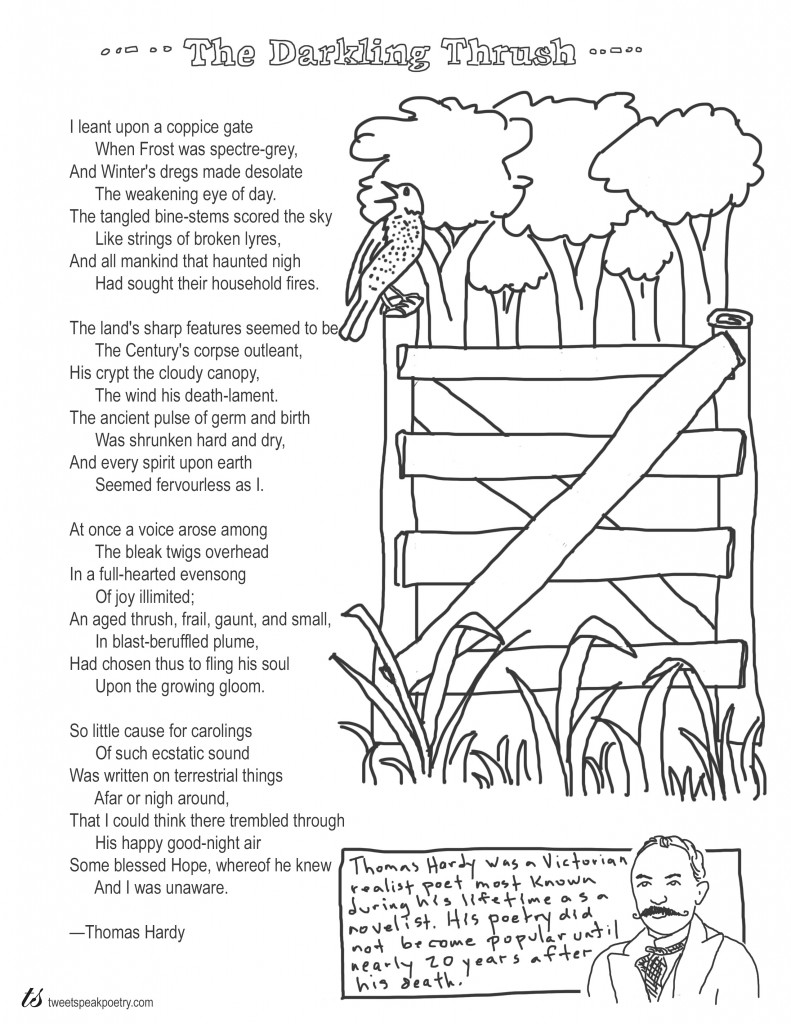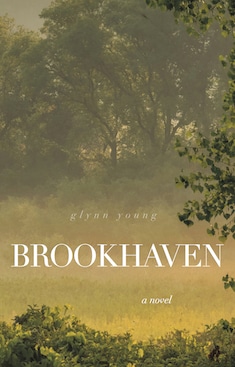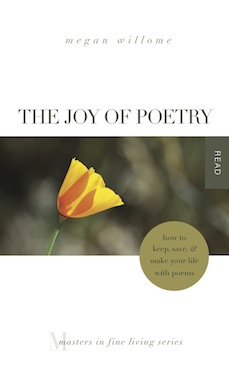I first noticed “The Darkling Thrush” by Thomas Hardy in December 2017, when it was featured as a winter poem at Poetry Foundation. Only later did I discover Will Willingham had made a coloring page for it as well.
I first knew Hardy as the author of Tess of the D’urbervilles, which I did not particularly enjoy. Neither did Hardy’s critics, and so he turned to poetry. But his poetry did not find its audience until after his death. Even now critics struggle with what makes his poems great, despite their often-gloomy tone.
“The Darkling Thrush” is a poem that makes me think of Charles Dickens’ A Christmas Carol, with phrases like “spectre-grey,” “haunted nigh,” and “every spirit upon earth.” But in this poem we don’t get three ghosts; we get The Darkling Thrush.
While learning this poem by heart, I noticed its many unusual words. These words became my handholds, like the kind found on a climbing wall. Weird word by weird word, I held on and made my way up the poem, all the way up to “Some blessed Hope.”
Let’s take those handholds, one at a time:
darkling—Meaning “done or taking place in the dark.” That means the poet doesn’t so much see the thrush as hear it.
coppice gate—Refers to a gate to a forest, the kind Will helpfully drew for us.

A view of tangled bine-stems from my driveway.
bine-stems—I always learn my poems outside, and all the trees in every direction, have lost their leaves. Those branches look like “tangled bine-stems,” and now I picture them as “strings of broken lyres.”
ancient pulse of germ and birth—This phrase sounds like a holy seed, waiting for life.
fervourless—This is the word I’ve been searching for all my life.
illimited—The dictionary quoted this very line to explain what “illimited” means. Notice it’s not unlimited; it’s illimited.
An aged thrush, frail, gaunt, and small, / In blast-beruffled plume—It may be because I’m reading Harry Potter and the Half-Blood Prince, but this is a perfect description of Dumbledore in book 6. He is old, he is dying, but his fashion sense remains impeccable. Among his many colorful robes, he must have one labeled “blast-beruffled plume.”
fling—I love strong, one-syllable words. How many other choices did Hardy have to describe what The Darkling Thrush does with its soul, but he chose “fling.” This bird is reckless. Watch out, “growing gloom.”
terrestrial things—When I get to this point in the poem, I look at my backyard bushes, trimmed back for winter, and the stones that make up the very soil of the Texas Hill Country, and I see them all waiting to be written upon.
air—As in a tune or melody.
Hope—With a capital H. Is there any other kind?
As you begin the new year with Tweetspeak and we explore the theme of wisdom, start with the weird, wise words of this poem. May you hear the fling of the thrush’s soul, even in 2020’s darkling hours.
Your Turn
Did you memorize “The Darkling Thursh” these last two months? Join our By Heart community and share your audio or video using the hashtags #ByHeart and #MemoriesWithFriends and tagging us @tspoetry. We also welcome photos of your handwritten copy of the poem.
By Heart for February
For the next By Heart gathering, February 28, we’ll learn “Snow-flakes” by Henry Wadsworth Longfellow by heart.
Snow-flakes
Out of the bosom of the Air,
Out of the cloud-folds of her garments shaken,
Over the woodlands brown and bare,
Over the harvest-fields forsaken,
Silent, and soft, and slow
Descends the snow.
Even as our cloudy fancies take
Suddenly shape in some divine expression,
Even as the troubled heart doth make
In the white countenance confession,
The troubled sky reveals
The grief it feels.
This is the poem of the air,
Slowly in silent syllables recorded;
This is the secret of despair,
Long in its cloudy bosom hoarded,
Now whispered and revealed
To wood and field.
—Henry Wadsworth Longfellow
Photo by Zach Dischner, Creative Commons, via Flickr. Post by Megan Willome.
Browse more By Heart
“Megan Willome’s The Joy of Poetry is not a long book, but it took me longer to read than I expected, because I kept stopping to savor poems and passages, to make note of books mentioned, and to compare Willome’s journey into poetry to my own. The book is many things. An unpretentious, funny, and poignant memoir. A defense of poetry, a response to literature that has touched her life, and a manual on how to write poetry. It’s also the story of a daughter who loses her mother to cancer. The author links these things into a narrative much like that of a novel. I loved this book. As soon as I finished, I began reading it again.”
—David Lee Garrison, author of Playing Bach in the D. C. Metro
- Perspective: The Two, The Only: Calvin and Hobbes - December 16, 2022
- Children’s Book Club: A Very Haunted Christmas - December 9, 2022
- By Heart: ‘The night is darkening round me’ by Emily Brontë - December 2, 2022




L.L. Barkat says
I did not memorize, but now I’m considering. Such an apt poem. And I do love that tension of darkness and persistence (through song) in its midst.
Megan Willome says
I think that tension is why I love it. Light does not come but song, and Hope, does.
Will Willingham says
Light does not come.
This is the reality so much of the time, isn’t it? And considering what does, in any case.
(Always a little startled when I see these coloring pages pop up in unexpected places. I’ve always wondered if this little wide-mouthed bird is singing or shouting or both.)
Megan Willome says
Sometimes Hope must be shouted.
Laura Lynn Brown says
I missed the post announcing this as the January memory poem. Oh, I wish I’d had it in the long span of sunlessness we just had. I do remember those last two lines as among those that embedded in my mind thanks to that British lit survey in college. I forgot to sing on some of those gray days.
Now hoping for a good thick snowfall to go with this month’s poem.
Megan Willome says
Laura, with taking a break over Christmas, it was easy to miss. But I’m glad to know you already knew those last two lines.
Hope you get just the “poem of the air” you need for Longfellow.